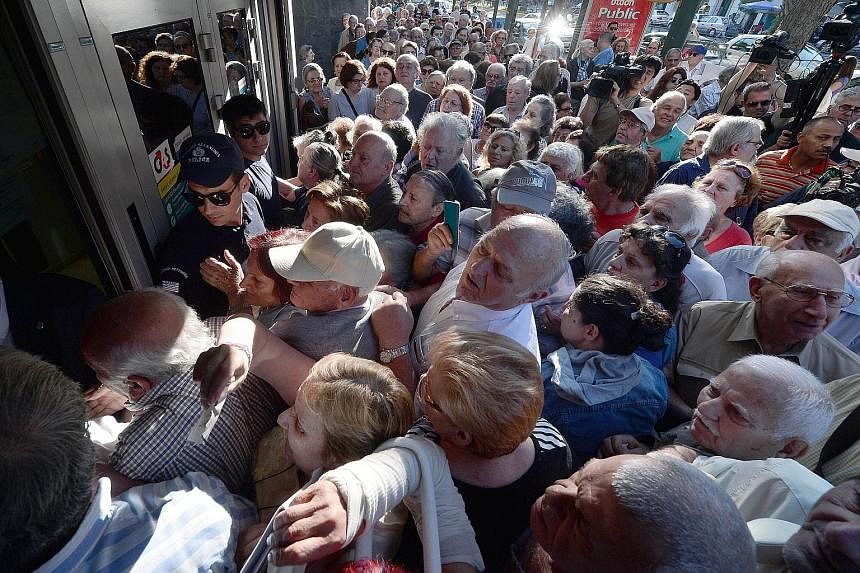There were signs that Greek Prime Minister Alexis Tsipras blinked yesterday in the tense stand-off with European Union (EU) officials over his nation's increasingly perilous predicament.
He wrote to EU officials, making concessions on some bailout demands in an effort to restart talks.
But there were demands as well and a tone of defiance when he spoke to the nation on TV yesterday. Mr Tsipras said he would press ahead with Sunday's referendum for voters to decide whether to accept a bailout deal offered by international creditors, despite rumours that it may be called off.
The defiance could not mask the sense of crisis that intensified yesterday, a day after the country became the first advanced economy to default on an International Monetary Fund loan. There were long queues at ATMs and signs that supplies of bank notes were running low, yet global markets seem less concerned.
Asian shares were mostly up as investors shrugged off Greece's default. Singapore closed 0.42 per cent higher, Tokyo rose 0.46 per cent, Seoul added 1.14 per cent and Taiwan gained 0.56 per cent.
European stocks were far more buoyant, galvanised in part by prospects that a deal may be hammered out. Shares in Milan, Paris, Frankfurt and London were up by between 2 per cent and 3 per cent.
All eyes last night were on the letter from Mr Tsipras, which seeks an extension of the bailout that expired at midnight on Tuesday but with "substantial" changes.
In exchange for making some concessions to the bailout plan, Athens wants a €29 billion (S$43.4 billion) loan to cover all its debt service payments due in the next two years, according to a letter seen by Reuters.
Euro zone officials said last night that some governments would find it hard to accept the demands.
An added irritation for EU officials is Sunday's referendum.
Mr Tsipras again called for a "no" vote when he spoke on TV but the outcome is in doubt, with signs that the "yes" camp is gathering force amid fears of what may lie ahead if Greece exits the euro zone.
The tension between the Tsipras government and EU officials is intensifying as the bank controls bite deep into Greek society.
Thousands of elderly Greeks yesterday besieged the nation's banks after the government temporarily reopened almost 1,000 bank branches to allow pensioners without ATM cards to withdraw €120 to last the rest of the week.
An Agence France-Presse report quoted Mr Dyonisia Zafiropoulou, a former employee of the national electricity company, saying: "I took the money out. I know that this is not enough, but that's what I could take and so I took it."
While all the parties involved seem to want some sort of deal, striking one will not be easy.
German Chancellor Angela Merkel reiterated yesterday that while the door for talks remained open, "we'll negotiate about absolutely nothing before the planned referendum is held", Bloomberg reported.
SEE TOP OF THE NEWS
2.65m face cuts in meagre payments
NTU don sees turmoil up close during trip home
No money left to pay their wages
Dozens of businesses closing down every day as people have less cash


